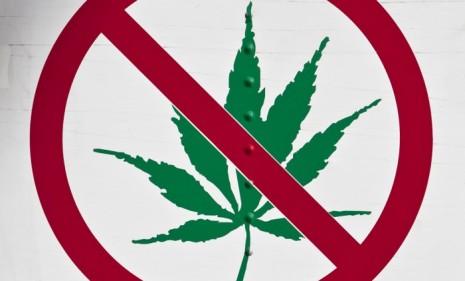Why did Prop 19 fail? 6 theories
California's ballot initiative to legalize marijuana attracted loads of international attention and celebrity support. So why didn't it pass?

A free daily email with the biggest news stories of the day – and the best features from TheWeek.com
You are now subscribed
Your newsletter sign-up was successful
Californians have snuffed out a ballot initiative that would have legalized pot and created a framework for taxing purchases, with approximately 54 percent of the state's voters opting against it. Why despite dramatic celebrity endorsements, seven-figure donations, and international attention did Prop 19 fall short? (Watch a CNN report about Prop 19's failure.) Here are 6 theories:
1. It's already practically legal
Early support for the measure led the state legislature to decriminalize marijuana at the beginning of October, and "smoking dope is now an infraction — like a parking ticket," says Tim Dickinson in Rolling Stone. "If you get hassled by a cop, the worst thing that'll happen to you is you have to pony up a $100 fine." Possessing a small amount of pot is neither a felony nor a misdemeanor, and that made passing Prop 19 seem less pressing.
The Week
Escape your echo chamber. Get the facts behind the news, plus analysis from multiple perspectives.

Sign up for The Week's Free Newsletters
From our morning news briefing to a weekly Good News Newsletter, get the best of The Week delivered directly to your inbox.
From our morning news briefing to a weekly Good News Newsletter, get the best of The Week delivered directly to your inbox.
2. Midterm voters tend to be older
The Prop 19 polling suggests a "surprisingly wide generation gap," says Charles Cooper at CBS News, with voters in their 20s and 30s supporting it by a wide margin, and those over 65 against approximately 2-to-1. Supporters of the initiative are pointing out that "older voters" are more likely to "participate in midterm elections" than younger ones, reports Lisa Leff for The Associated Press, and predicting they'll have better luck in 2012, when there's a presidential race on the ballot.
3. Fear of the Feds
"Voters may have soured, and enthusiasm may have dipped, after Attorney General Eric Holder vowed to fight Prop 19 if it passed and 'vigorously enforce' federal drug laws in the state," says Chris Good in The Atlantic. The question of how the federal government would react to legalization loomed large over Prop 19, and Holder's smackdown "may have effectively killed this measure."
A free daily email with the biggest news stories of the day – and the best features from TheWeek.com
4. Promises, promises
Prop 19 advocates promised that legalization would help the state's budget crisis and curb Mexican drug violence. "Both claims were overblown," says Jeffrey A. Miron at CNN. Voters sensed these claims were overreaching, and that made them suspicious of the benefits of the legislation as a whole. "Common sense should have recognized that since marijuana is close to legal already, Prop 19 would not have had dramatic effects."
5. Too much establishment muscle against it
With the public so closely divided on the issue, the uniformity of the establishment's opposition was notable: "Every major newspaper, both major political parties, the two candidates for governor and all but a handful of leading politicians came out against it," say David Crary and Lisa Leff at The Age.
6. The stoner divide
Those who worked to legalize marijuana for medicinal use in California weren't necessarily on board this time around. The measure actually lost in the state's key marijuana growing region — known as the "Emerald Triangle" and encompassing Humboldt, Mendocino, and Trinity counties — because "many in the region feared the system they have created would be taken over by corporations or lose its purpose," reports The Associated Press. There were even rumors in the region that tobacco kingpin Philip Morris was planning on getting into marijuana growing business if the measure had passed, reports the Contra Costa Times.
-
 Switzerland could vote to cap its population
Switzerland could vote to cap its populationUnder the Radar Swiss People’s Party proposes referendum on radical anti-immigration measure to limit residents to 10 million
-
 Political cartoons for February 15
Political cartoons for February 15Cartoons Sunday's political cartoons include political ventriloquism, Europe in the middle, and more
-
 The broken water companies failing England and Wales
The broken water companies failing England and WalesExplainer With rising bills, deteriorating river health and a lack of investment, regulators face an uphill battle to stabilise the industry